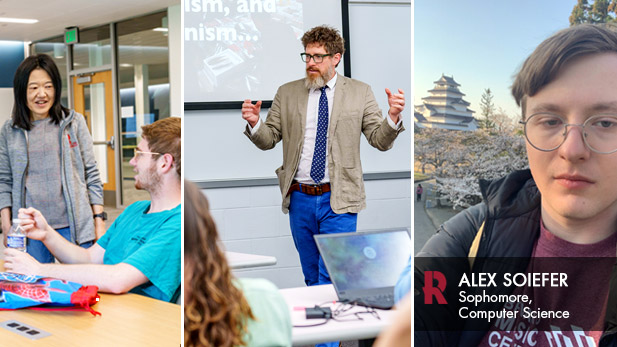Japanese Language and Society Courses Enhance the STEM Degree

Like other Rose-Hulman students, Alex Soiefer, a sophomore majoring in computer science, is adding value to his degree by coupling it with the study of Japanese language through Rose’s Humanities, Social Sciences and Arts (HSSA) department.
Alex Soiefer came to Rose-Hulman to pursue a STEM degree. Soiefer, a sophomore majoring in computer science, is adding value to his degree by coupling it with the study of Japanese language through Rose’s Humanities, Social Sciences and Arts (HSSA) department. That combined interest in the technical and Japanese language is helping him complete a successful study abroad experience at Aizu University in Aizu-Wakamatsu, Japan.
“I started studying Japanese in high school … and I continued at Rose since I want to eventually become fluent in Japanese,” said Soiefer. “[At Aizu University] I am taking a class focused on compilers and auditing a class based on image and audio processing in the context of app/game development, both of which are directly related to my major. And I’m gaining language proficiency, which will help me reach my goal to work at a Japanese or international company.”
The Japanese Language, Culture and Society classes are some of the most popular HSSA courses at Rose. The classes help students become creative, sophisticated thinkers, active citizens, and effective leaders in the global community. Additionally, these learning experiences enrich their scientific and technical education.
“The Rose degree will get students a job, but if they want to thrive and get to a place where they make decisions and are promoted, they need our classes,” said Associate Professor of Anthropology Paul Christensen, PhD, who teaches the Japanese Society course.
“When students enter the workforce, they have to engage with people throughout the world and understand what they say and communicate in a meaningful way. They have to solve problems where there isn’t always an immediate and clear answer. These HSSA classes allow them to thrive and do well in their work.”
Professor of Japanese Maki Hirotani, PhD, has been teaching Japanese language at Rose for 18 years. Hirotani sees a natural fit for the language and culture classes with engineering students’ interest in anime, gaming and technology. She believes once students start learning the language and culture, they find other areas of interest including Japanese architecture and history.
“Students at Rose are very engaged, and they enjoy learning something different … they open their eyes and look at other worlds,” said Hirotani.
The Japanese courses are supplemented by Rose’s partnerships with Japanese universities, including Aizu University in which students study computer science. Rose’s sister school, Kanazawa Institute of Technology, offers a Japanese language program. More recently, Rose partnered with Sophia University, a liberal arts research institute located in the center of Tokyo where students are immersed in the Japanese culture.
Hirotani allows for her students to build relationships with students at Japanese partner schools through virtual collaborative courses. Her second-year Japanese language class students worked on an intercultural collaborative exchange with five students at Shizuoka Kenritsu Daigaku (KenDai) in Shizuoka, Japan.
Before the pandemic, many Rose students regularly studied abroad. Many students traveled to Japan each summer as part of the Kanazawa Institute of Technology language program. Students, like Soiefer, are now starting to return to Japan through study abroad.
In June 2017, Hirotani and Christensen took nine students to Tokyo. The students had just completed a Tokyo exploration course co-taught by the professors, and the group spent ten days studying architecture and emersed in the city they just studied. The Tokyo course and trip is scheduled to occur again in spring 2024.
Christensen’s Japanese Society course focuses on the culture of anthropological structures of Japan. Students examine the institutions of life and relationships, which can then be used as a framework for understanding other world cultures. The class delves deeper into Japanese culture and its influence on modern concepts. For example, students grew up with a fascination with Pokémon. Through the class, they learn the phenomenon stems from Japanese folklore and mythology and consider how that history and religion in the natural world was turned into a pop culture commodity.
Maggie Frachioni, a senior majoring in computer engineering with a minor in anthropology, took the Japanese Society class because she enjoyed the lectures centered around Japan during Christensen’s Medical Anthropology class. She sees quite a bit of correlation between the lessons from Japanese Society and her computer engineering major.
“Dr. Christensen has done a great job with including discussions on the impacts of technology in Japan in his class,” said Frachioni. “One of the more interesting topics for me has been looking at the causes and repercussions of several disasters in Japan, such as the nuclear accident in Fukushima in 2011.”
“During lecture, he has directed student conversations about ethics and has encouraged the analysis of decisions made by engineers and government leaders surrounding the incident and how these impacted the relationships between these groups and Japanese citizens.”
HSSA classes such as Japanese Language and Society not only help students learn a different language and cultural understanding, but also enhance the technical skills and expertise they acquire at Rose.
“At Rose, students are pursuing an education or career where they create and make things, and we try to encourage them to think about that as a comprehensive and holistic process,” said Christensen. “Students will go so much farther if they can take their ideas and put them in conversation with someone else’s and together, they can, hopefully, push those ideas farther. That’s what these classes help students achieve.”